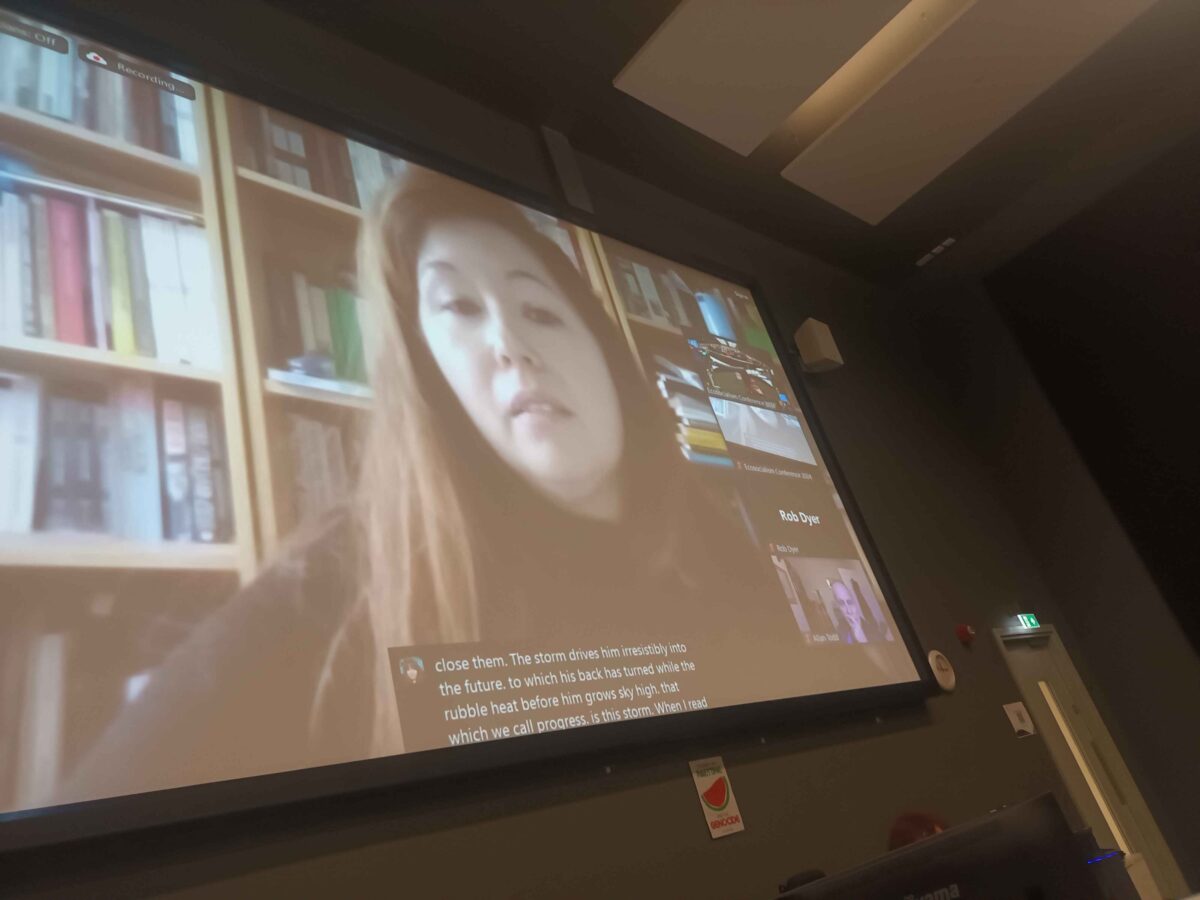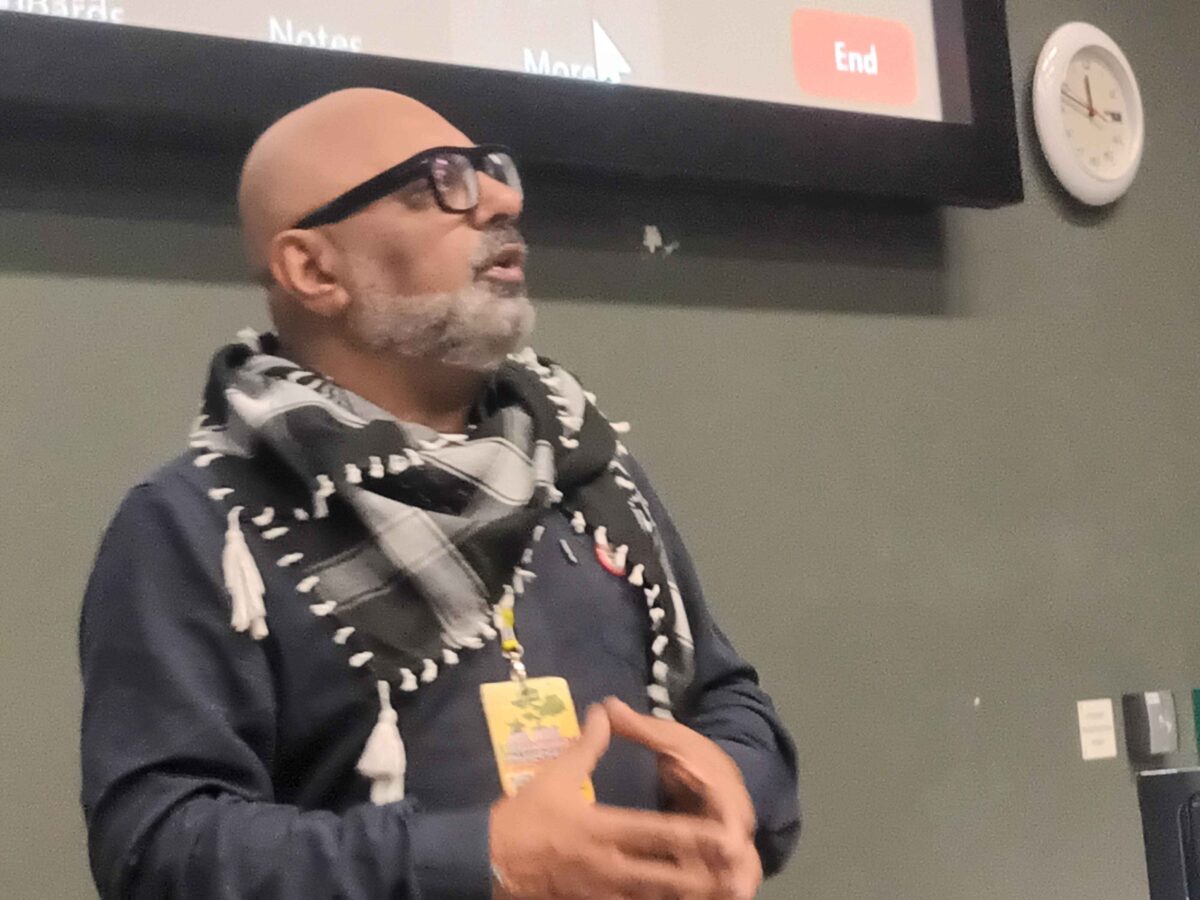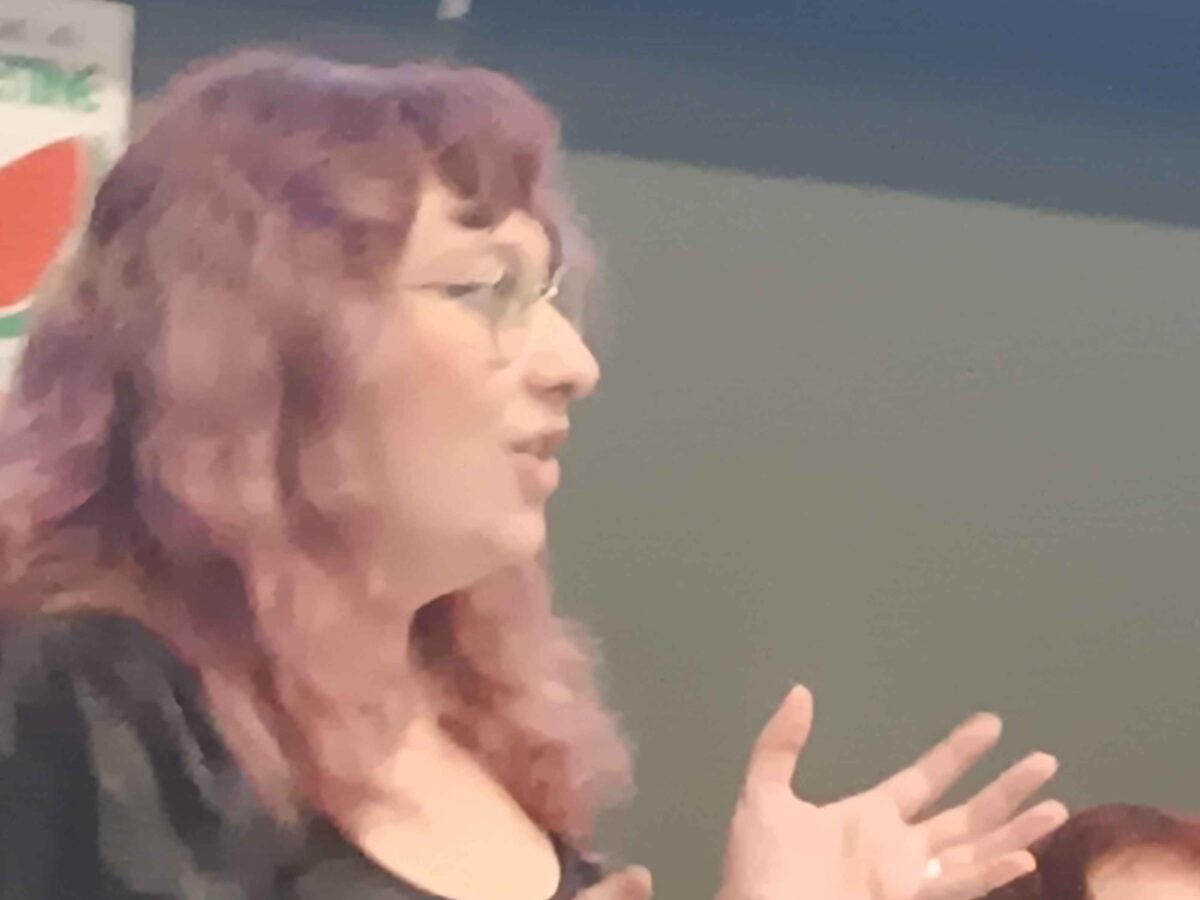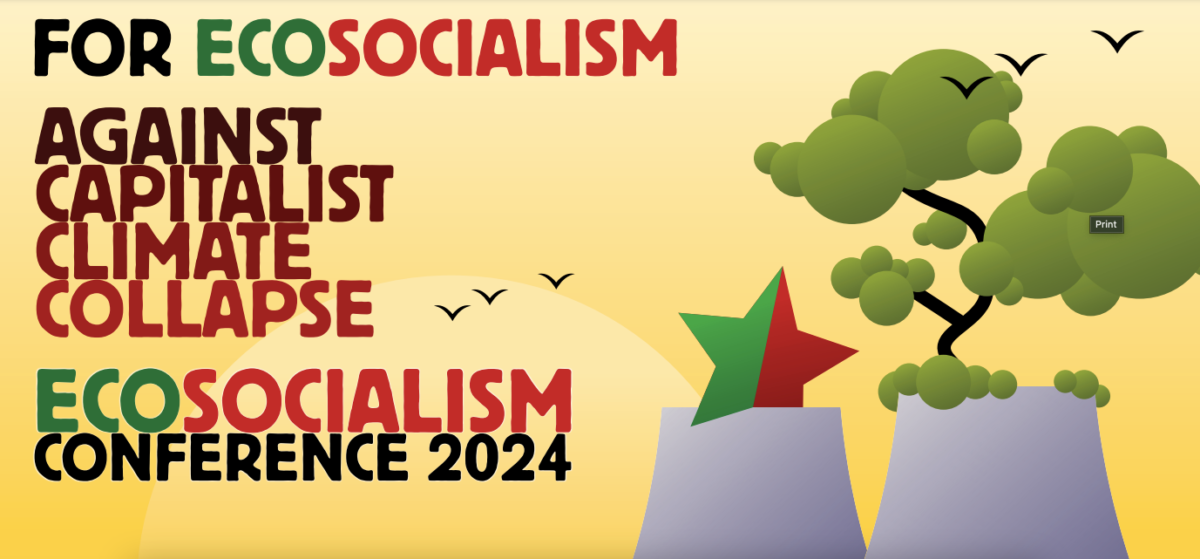Conference launches strategy to build a mass movement to meet the climate emergency created by capitalism
On 7 December 2024, over 150 people gathered at London South Bank University with some joining online to discuss and build an international ecosocialist movement.
2024 has witnessed a further acceleration in the environmental crisis. The environment humanity shares continues to be under attack on land, sea, and air by a global capitalist economy and entrenched fossil fuel industries, irrespective of the cost to the natural world.
The Ecosocialism Conference took place just two weeks after COP29 in Azerbaijan saw the agreement of a hopelessly inadequate climate finance deal leaving poorer nations to cope with and adapt to the significant harms being caused by the climate emergency with minimal support from the richer nations.
Following the popularity and success of the 2023 Ecosocialism Conference, which was held entirely in plenary, we wanted to expand the participation in this year’s conference. Ecosocialism interacts with myriad social, environmental and justice issues, all of which should be engaged with. We therefore structured the day to give attendees more variety and choice in the subjects being discussed, as well as ensuring each session was hybrid so that people could attend online.


The opening plenary set the tone for the day. On behalf of the organising committee Simon Hannah set out a framework for the day’s discussions, particularly emphasising the link between combatting the growth of the far right and the need to promote and develop an ecosocialist alternative. Jess Spear from Rise in Ireland joined us online and, as well as talking about the intersection of different tipping points in a calamitous spiral, looked at why the Green Party in Ireland had done so badly in the recent elections as it had been in coalition with Fianna Fáil and Fine Gael and lost credibility as a radical alternative as a result. Asad Rehman from War on Want resisted focusing solely on what had and hadn’t happened at COP29 in Baku, and highlighted recent developments in different parts of the Global South such as the Sri Lankan financial crisis and resulting mass protests following its 2022 foreign debt default which have shaken mainstream political narratives.
During the second session, attendees could choose from three different topics, each was in its own lecture theatre with a hybrid zoom link for online attendees.
- How might ecosocialist planning work?: Simon Hannah introduced some of the main topics in his new book Reclaiming The Future: A Beginners Guide to Planning the Economy, on how social ownership and participatory economic democracy could create a more sustainable economy. His focus was on eliminating production for profit and how that can lead to a more sustainable relationship with nature. Eric Meier, a co-founder of INDEP – the International Network for Democratic Economic Planning, gave an overview of the historical and recent development of the discourse on economic planning. He concluded with the outlook that the question of whether democratic economic planning is possible is fundamentally solved with a resounding yes and that what we have to tackle and struggle for are questions regarding its institutional form, the role of technology and how it can be strategically integrated into campaigns and programs.
- Dismantling green colonialism:Hamza Hamouchene, a London-based Algerian activist, spoke first about the unjust effects on the global south brought on by the capitalist class in the global north, citing research from his most recent book Dismantling Green Colonialism. Natalie Trevino, an Interdisciplinary critical theorist of space exploration, spoke about the colonial history of space exploration and how its current leaders are selling the false idea that colonising the Moon is our ticket to solving the climate crisis.
- Worker solidarity and the GKN documentary: Shaun Dey from Reel News premiered his documentary about the GKN factory occupation. The documentary looked at how, when faced with the threat of mass redundancies, GKN automotive workers in Florence occupied their factory to save jobs and build green technology. After the documentary we heard from Em Wright who is part of the Worker Climate Project, which connects and empowers trade unionists fighting on climate issues and a just transition in their workplace. The discussion which followed touched on practical elements of trade union organising and how this interacts with wider class struggle as well as issue-specific campaigns, such as fuel poverty. The session discussed the challenges faced by projects like the GKN occupation, which might be characterised as “islands of socialism” still forced to operate within capitalism (i.e., the GKN factory must still create a surplus and profit in order to survive).
Lunch was provided in the exhibition space, where a number of supporting organisations had their stalls. After lunch, attendees had the choice of attending one of the following two discussions:
- Fighting the far right and conspiracy theories: Richard Hames (the real name of Sam Moore) co-author of The Rise of Ecofascism: Climate Change and the Far Right. Richard spoke about different tendencies on the far right have different approaches to the environment – not only the denialism that we are very familiar with but also approaches that, for example, blame migrants or “woke” approaches and seek to promote green capitalism. Alex Heffron, a farmer and writer from South Wales, gave a very interesting argument about how green policies are seen as a threat by some farmers and this can drive them into the arms of the climate-denying far right. Alex spoke about how we could develop ecosocialist policies for farmers that acknowledge the precarious nature of farming for poorer farmers and tackle the massive agro-business and supply chain bosses (such as supermarkets).
- Building ecosocialist movements: The session looked at the formation of an ecosocialist movement from different perspectives. We heard about the importance of incorporating the social model of disability; the role that can be played by unions in movement building; and the international situation with a focus on linking up struggles around the world with their particular challenges and concerns. The discussion afterwards was constructively critical, with debate on models for understanding disability as an oppression, on the limits of union leaderships, and the difficulties in overcoming the vested interests of the imperial core.


The day ended with a conference-wide session on strategy to discuss building ecosocialist movements. The session launched an Ecosocialist Action Network focused on being active in the worker’s and environmental movements to campaign for them to build a mass campaign to address the climate emergency.
Will McMahon – one of the conference co-organisers – said “I thought the conference was a great success and I am looking forward to building the Ecosocialist Action Network over the next year so we can take these radical ideas out into the wider world”.
Terry Conway, from Hackney and Islington Unite Community which sponsored and sent delegates to the event, said “The Ecosocialism Conference 24 confronted the hard political realities and examined how we can transform our planet to address the environmental crisis. But by bringing people together to discuss the emergency caused by rampant capitalism and how to campaign for ecosocialist alternatives it also brought a message of hope.”
Conference co-organiser, Paris Wilder, said “Environmental movements across the world are demanding governments to take action, but shy away from challenging the underlying system that has given rise to climate change: capitalism.”
Assistant Branch Secretary of Lambeth UNISON, Simon Hannah – whose union branch helped sponsor the conference – said “the discussions were great and it was useful to think about local campaigns as well as wider political debates like reform or revolution to save the planet. We will be building the ecosocialist movement throughout 2025 with the aim for a big action around COP30 later in the year.

The conference statement from the conference organising committee is due to be published soon. The general focus at the end of the conference was the following:
- Incremental reforms are not enough – we need radical systemic change.
- Campaigns need to both challenge the wasteful market logic of capitalism and at the same time as fighting climate change.
- Ecosocialism should work to revolutionise how we use and think about resources – like campaigns for free public transport campaigns under public ownership.
- To act in solidarity with refugees and immigrants and those forced to move as climate conditions make their lives impossible.
See also the final conference statement here
Source: Ecosocialism Conference

